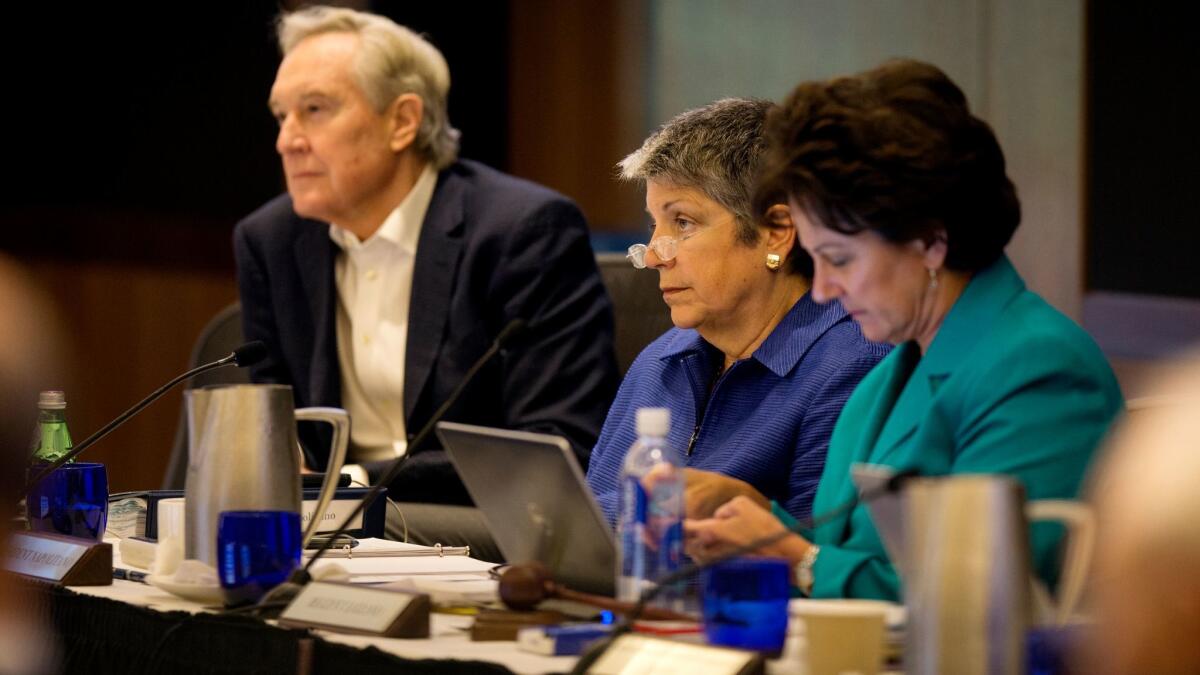UC regents, with four new members, plan to debate budget, admissions

Reporting from San Francisco — Los Angeles civic leader George Kieffer says he is “revved up” about taking the helm of the UC Board of Regents this week, and he’s already set his top priority: improve relations with state lawmakers.
UC may be the nation’s top public research university, but tensions with Sacramento have escalated in recent years. Legislators have begun exerting more control over the system’s purse strings and this year voted themselves the power to directly fund the Office of the President.
The actions came after a state audit in April found shortcomings in the financial practices of the president’s office, and another review last year concluded that UC hurt Californians by admitting too many nonresident students.
UC leaders take issue with many of the audits’ conclusions, but all agree that the gulf with Sacramento must be addressed.
“I’m confident if we do our job and address the particular concerns raised by the Legislature, we’ll get past this,” Kieffer said in a recent interview.
“But we need to listen more carefully and engage more actively, because there are other very serious issues confronting all of public higher education in general, and we need greater mutual understanding and a stronger partnership with the Legislature in order to address them.”
The new board chairman said his other priorities include improving undergraduate education and further expanding access to UC.
The regents, who meet Wednesday and Thursday in San Francisco, will vote to give final approval to the Office of the President’s $813.5-million budget. Heeding the audit’s recommendations for more transparent budget practices, the regents’ finance committee held a special meeting last month to drill down into the spending plan; further discussion by the full board is scheduled for Thursday.
The proposed budget imposes new cost controls, including a minimum 10% reduction in employee travel spending.
One concern is the impact of the Legislature’s decision to fund the president’s office directly with a $296-million appropriation that would otherwise go to campuses. Smaller campuses without money-making medical centers, such as UC Santa Cruz, have fretted they will lose out under the new method, while the UC Academic Senate says it will hurt educational quality by forcing budget cuts on every state-funded program.
In other business, regents will consider a proposal to allow all campuses to invite up to 15% of applicants to submit letters of recommendations. UC Berkeley began inviting such letters two years ago, in a limited pilot program to better understand their applicants, and wanted to expand to all prospective students.
But the UC Academic Senate is proposing the more proscribed approach after some faculty voiced concern that inviting letters could disadvantage students from underserved schools that may lack counselors and teachers to write them, and impose greater workloads on schools.
RELATED | UC Board of Regents adds experts in sports management, media, arms control, finance »
Four new regents will join the 26-member board, bringing it to full strength for the first time in two years. They are:
- Maria Anguiano, a previous vice chancellor for planning and budget at UC Riverside and now chief financial officer at Minerva Project Inc., a for-profit educational organization in San Francisco.
- Howard “Peter” Guber, co-owner of the Golden State Warriors and chairman and chief executive officer at Mandalay Entertainment Group
- Lark Park, a UC Berkeley alumna and senior adviser to Gov. Jerry Brown for policy.
- Ellen Tauscher, undersecretary of state for arms control and international security under President Obama and a former U.S. representative for the 10th Congressional District, which covers the northern San Joaquin Valley.
Kieffer, a partner with the national law firm of Manatt, Phelps & Phillips LLP, received a bachelor’s degree in history from UC Santa Barbara and a law degree from UCLA. He said he still marvels at how much the university does to educate first-generation students, provide healthcare to the needy, research cures, manage national laboratories and support the state’s agricultural sector.
“This university is something of a miracle” he said.
More to Read
Sign up for Essential California
The most important California stories and recommendations in your inbox every morning.
You may occasionally receive promotional content from the Los Angeles Times.










